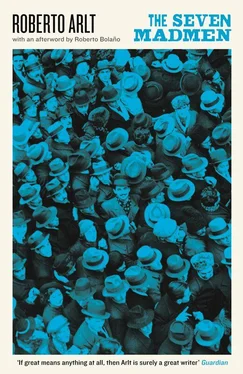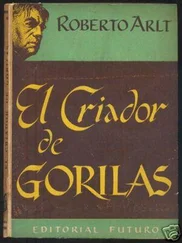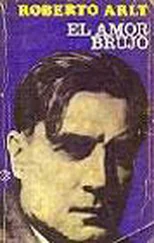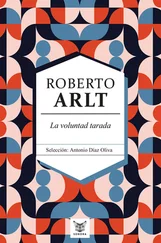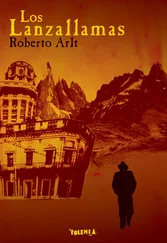The third lineage in play in contemporary or post-Borgesian Argentine literature is the one that begins with Osvaldo Lamborghini. This is the secret current. It’s as secret as the life of Lamborghini, who died in Barcelona in 1985, if I’m not mistaken, and who left as literary executor his most beloved disciple, César Aira, which is like a rat naming a hungry cat as executor.
If Arlt, who as a writer is the best of the three, is the basement of the house that is Argentine literature, and Soriano is a vase in the guest room, Lamborghini is a little box on a shelf in the basement. A little cardboard box, covered in dust. And if you open the box, what you find inside is hell. Forgive me for being so melodramatic. I always have the same problem with Lamborghini. There’s no way to describe his work without falling into hyperbole. The word cruelty fits it like a glove. Harshness does too, but especially cruelty . The unsuspecting reader may glimpse the sort of sadomasochistic game of writing workshops that charitable souls with pedagogical inclinations organize in insane asylums. Perhaps, but that doesn’t go far enough. Lamborghini is always two steps ahead of (or behind) his pursuers.
It’s strange to think about Lamborghini now. He died at forty-five, which means that I’m four years older than he was then. Sometimes I pick up one of his two books, edited by Aira — which is only a figure of speech, since they might just as well have been edited by the linotypist or by the doorman at his publishing house in Barcelona, Serbal — and I can hardly read it, not because I think it’s bad but because it scares me, especially all of Tadeys , an excruciating novel, which I read (two or three pages at a time, not a page more) only when I feel especially brave. Few books can be said to smell of blood, spilled guts, bodily fluids, unpardonable acts.
Today, when it’s so fashionable to talk about nihilists (although what’s usually meant by this is Islamic terrorists, who aren’t nihilists at all), it isn’t a bad idea to take a look at the work of a real nihilist. The problem with Lamborghini is that he ended up in the wrong profession. He should have gone to work as a hit man, or a prostitute, or a gravedigger, which are less complicated jobs than trying to destroy literature. Literature is an armor-plated machine. It doesn’t care about writers. Sometimes it doesn’t even notice they exist. Literature’s enemy is something else, something much bigger and more powerful, that in the end will conquer it. But that’s another story.
Lamborghini’s friends are fated to plagiarize him ad nauseam, something that might — if he could see them vomit — make Lamborghini himself happy. They’re also fated to write badly, horribly, except for Aira, who maintains a gray, uniform prose that, sometimes, when he’s faithful to Lamborghini, crystallizes into memorable works, like the story “Cecil Taylor” or the novella How I Became a Nun , but that in its neo-avantgarde and Rousselian (and utterly acritical) drift, is mostly just boring. Prose that devours itself without finding a way to move forward. Acriticism that translates into the acceptance — qualified, of course — of that tropical figure, the professional Latin American writer, who always has a word of praise for anyone who asks for it.
Of these three lineages — the three strongest in Argentine literature, the three departure points of the literature of doom — I’m afraid that the one which will triumph is the one that most faithfully represents the sentimental rabble, in the words of Borges. The sentimental rabble is no longer the Right (largely because the Right busies itself with publicity and the joys of cocaine and the plotting of currency devaluations and starvation, and in literary matters is functionally illiterate or settles for reciting lines from Martín Fierro ) but the Left, and what the Left demands of its intellectuals is soma, which is exactly what it receives from its masters. Soma, soma, soma Soriano, forgive me, yours is the kingdom.
Arlt and Piglia are another story. Let’s call theirs a love affair and leave them in peace. Both of them — Arlt without a doubt — are an important part of Argentine and Latin American literature, and their fate is to ride alone across the ghost-ridden pampa. But that’s no basis for a school.
Corollary. One must reread Borges.
